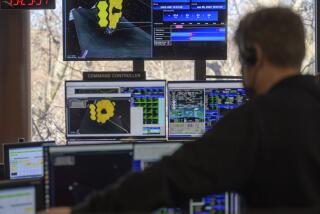Justice Department Files Suit Against Northrop Over Alleged Inflated Costs on Jet : Aerospace: The government says the company failed to disclose cost-saving technology on the F/A-18. Damages are at least $25 million, says a lawyer familiar with the case.
- Share via
The Justice Department sued Northrop Corp. for millions of dollars in damages and penalties Wednesday, alleging that the Los Angeles aerospace firm fraudulently inflated bills it submitted to the Navy for work on the F/A-18 fighter-bomber.
Although government officials said they had not determined the precise amount of damages, a private lawyer familiar with the case said they were at least $25 million and that the recovery could be three times that amount because the suit was filed under the federal False Claims Act, which allows treble damages.
The suit marks the fourth time in the last two years that the government has sued a Northrop operation for fraud or has joined in suits that were filed against the company by whistle-blowers.
The company, whose headquarters are in Century City, also faces at least three federal criminal investigations around the country and several other civil suits by former employees.
The civil suit filed in U.S. District Court here Wednesday alleges that the company failed to disclose savings it had achieved from a new manufacturing process that enabled it to produce parts for the F/A-18 at considerably less cost than it had in the past.
Northrop spokesman Tony Cantafio said the company had no comment to make since it had not yet been served with the suit.
The action was originally filed in 1987 by Eldon L. Janssen of Agoura Hills, a former Northrop employee. Under the False Claims Act, a private party can sue--on behalf of the government--companies and individuals who have defrauded the government. The government then has the right to intervene in the case and assume control of the litigation.
The statute provides that all such suits filed by private individuals are placed under seal and the government is given at least 60 days to investigate the case and determine if it wants to intervene. Frequently, the government is given lengthy extensions for a variety of reasons.
In this instance, at least part of the delay in unsealing the case was the fact that the Justice Department had also been exploring the possibility of criminal charges in the case, according to William R. Ramsey of Encino, Janssen’s lawyer.
Ramsey said, however, that the Justice Department had decided against filing criminal charges in the case. He also said that this was one of numerous criminal investigations that the government had agreed to drop in February when Northrop pleaded guilty to 34 criminal fraud counts and paid a $17-million fine in connection with tests on a stabilization device for a Marine jet fighter and on guidance equipment for a nuclear-armed cruise missile.
Justice Department officials declined to comment on any prior criminal investigation. However, the agency issued a formal statement announcing the unsealing of the civil suit.
“The government’s assumption of this suit signals its continued determination to assure that all federal contractors are honest in their dealings with the government,” said Stuart M. Gerson, assistant attorney general in charge of the civil division.
If the government wins such a suit, the individual who brings the fraud to the government’s attention can collect 15% to 25% of any award that is recovered.
Janssen was manager of major equipment procurement for Northrop’s aircraft division from June, 1983, to July, 1985. He then served as manager of contracts and pricing in Northrop’s Ventura division from July, 1985, to August, 1986, a period in which he learned about the wrongful conduct alleged in the suit, according to court documents.
Janssen was dismissed by Northrop in May, 1987, according to the suit, and is working as a defense industry consultant, according to Ramsey. The lawyer said the damages sought in the suit were at least $25 million.
The suit stems from work Northrop did as the primary subcontractor for McDonnell Douglas Corp. on the F/A-18. The Navy has purchased hundreds of these aircraft from McDonnell Douglas since it went into full production in 1981.
Both McDonnell Douglas’ contract and Northrop’s subcontract are what is known as sole source, fixed-price agreements. This means that only one contractor is deemed qualified to perform the work, and there is no competitive bidding.
Northrop’s primary responsibility on the plane is the building of the center and aft sections of the fuselage. As part of this work, Northrop manufactures each year a number of identical sets of itemized parts for the aircraft, according to the suit.
Most of these parts are made of so-called composite materials that must be shaped and refined under high pressure and heat, using a vacuum process.
More to Read
Inside the business of entertainment
The Wide Shot brings you news, analysis and insights on everything from streaming wars to production — and what it all means for the future.
You may occasionally receive promotional content from the Los Angeles Times.










